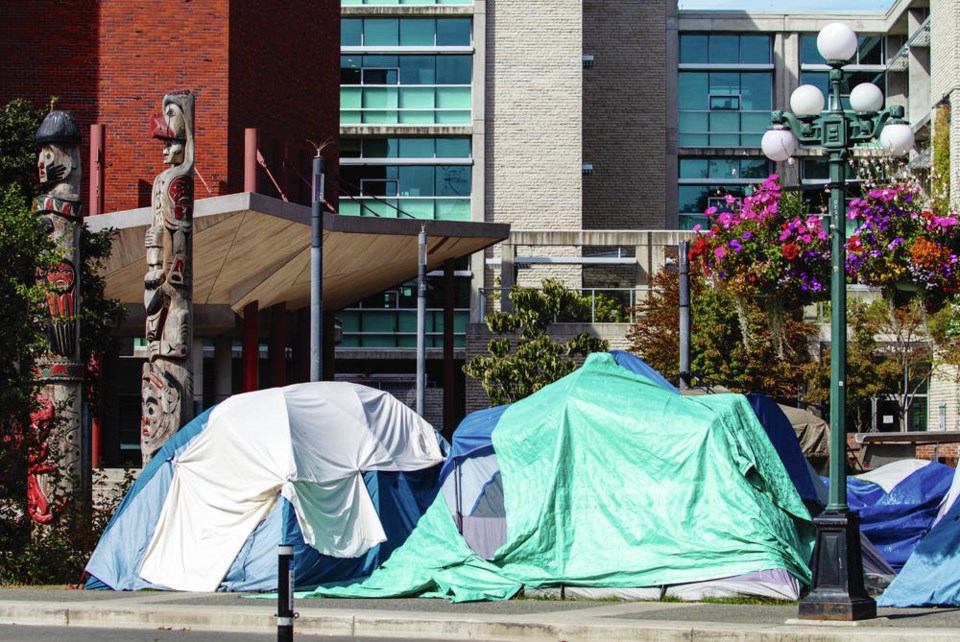An encampment in Centennial Square that has attracted drug trafficking and violence has become “untenable,” Victoria Mayor Lisa Helps said Thursday.
The mayor couldn’t say when, or if, tents in the square would be dismantled, but said city staff are working on the issue.
“We’re going to be looking at what steps we can take,” said Helps. “I can’t give any promises, but I can say it’s top-of-mind for all of us at this point.”
Help made the comments a day after Victoria police announced that 17 people are facing drug-trafficking charges in connection with a drug ring operating out of a rotating group of tents pitched in the square. Police have also been called to two stabbings and multiple assaults in the square this month.
“I want to thank Vic PD for their efforts,” said Helps. “Poverty isn’t a crime. Trafficking drugs is a crime.”
Council held a special closed meeting Thursday to receive legal advice on how to better manage encampments in the city when council resumes sitting next week.
“We know that the current situation isn’t working for anyone. Whether people are housed or unhoused, it’s become unmanageable,” said Helps.
Staff will publish their report with proposals for change by Monday. It will be available to the public as part of the regular agenda and council will dig into those recommendations at its regular Thursday meeting, said Helps.
“Centennial Square is a special issue, so we might see some changes there earlier than that, based on the police report we received yesterday,” she said.
The issue is complex and requires thoughtful, rational approaches that won’t push the problem around and create further risk, said Helps.
“But with Centennial Square, I think we can all see with the work the police has done that there’s a special situation there that needs special quick attention.”
The city has to find a balance between allowing people to shelter outdoors during the provincial state of emergency and ensuring parks are available for public use, said Helps.
And she warned there would be no rapid resolution, with 275 people living outside with nowhere to go.
The mayor said she keeps reminding herself of provincial health officer Dr. Bonnie Henry’s phrase ‘This is for now, it’s not forever.”
“We will have our parks back. We’ll have our playgrounds back,” she said.
Councillor Geoff Young called the encampment situation in Victoria deplorable and said it’s “absolutely essential” to eliminate daytime camping. “[Campers] feel like they own this little bit of the park and they don’t want citizens walking by, coming into their area.”
Young raised the spectre of injunctions, which were used to dismantle the former tent city at the Victoria courthouse. “We know it’s tough. That’s one of the reasons I didn’t want to see these things entrenched, but they are now. We’ve got a hole to dig ourselves out of.”
Young said he has received many deeply distressing emails from people who have had interactions with campers. Some believe the tenters are casing their homes and stealing things. People feel they are unable to use the parks.
Young admitted he is frustrated, but hopes some of his fellow councillors have started to change their views on the issue. “They have seen some of the impacts. I would hope some will try to change the direction they are going, but I suspect that others are convinced that the direction we chose is the only one that’s possible and we just have to stick with it.”
On Thursday, the provincial government announced that it has bought two lots at 1053 and 1075 Meares St. to build up to 50 new permanent homes with around-the-clock supports for people in the community experiencing homelessness.
“Everyone deserves a good, safe place to call home, and the need for new supportive housing in Victoria is clear,” said Carole James, MLA for Victoria-Beacon Hill. “This housing with wraparound supports will make a real difference for people who are experiencing or at risk of homelessness, giving them a place of their own where they can stabilize and rebuild their lives.”
Once a proposal is in place in early 2021, B.C. Housing will engage with the community to share more information about the project. In addition, a new community advisory committee will be set up to oversee the supportive housing’s integration within the community and address any concerns raised by people in the neighbourhood. Residents will be provided with 24/7 on-site staff and support services, including meal programs, life and employment skills training, and health and wellness support services.



